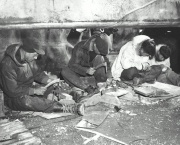Difference between revisions of "Beach ivory"
Jump to navigation
Jump to search
m (Text replace - "== Authority ==" to "== Sources Checked for Data in Record ==") |
|||
| Line 24: | Line 24: | ||
O. Untracht, ''Jewelry Concepts and Technology'', Doubleday & Co., Inc., New York, 1985. | O. Untracht, ''Jewelry Concepts and Technology'', Doubleday & Co., Inc., New York, 1985. | ||
| − | == | + | == Sources Checked for Data in Record == |
* Oppi Untracht, ''Jewelry Concepts and Technology'', Doubleday & Co., Inc., New York City, 1985 | * Oppi Untracht, ''Jewelry Concepts and Technology'', Doubleday & Co., Inc., New York City, 1985 | ||
Revision as of 14:02, 29 April 2016
Description
The Eskimo name for fossilized walrus tusks that are sometimes washed up on Arctic beaches (Untracht 1985). Beach ivory pieces may be old or recent. Their often mottled color ranges from nearly white to dark violet brown. Many have been infiltrated with dissolve minerals that add a crystalline, or marble-like, appearance to the tusk.
Synonyms and Related Terms
walrus tusk; fossil ivory
Other Properties
May weigh 7-15 pounds. Denser and darker than elephant ivory.
Outer enamel ranges from 0.8-1.2 cm
| Density | 1.90-2.00 |
|---|
Additional Information
O. Untracht, Jewelry Concepts and Technology, Doubleday & Co., Inc., New York, 1985.
Sources Checked for Data in Record
- Oppi Untracht, Jewelry Concepts and Technology, Doubleday & Co., Inc., New York City, 1985
